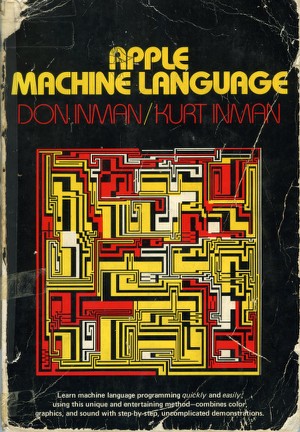
Tue, Aug 22, 2006, 2:05am
Apple ][ Time Warp
Computers » History

E
mulators for the old Apple ][ line* really tug at my heart strings. The second language I ever learned after BASIC (and Integer BASIC, if that counts as different), back in junior high / early high school, was 6502 machine language. Somehow, my friend Jordan and I got it into our heads that we could tackle machine language. Good thing we didn't know any better. Learning hex arithmetic was neat, but learning how to string them together in memory to make a program was crazy and fun. The hardest part was learning high res graphics and how to talk with external devices.
There was a very hard book that Jordan had, that I never ended up reading, but then we both got a copy of this great book by Inman and Inman, my copy shown to the right. Also, later we dove into another amazing machine language book for the ][s, Apple Graphics and Arcade Game Design by Stanton, which I also still have. Promised to teach one how to make a Defender game. 'nuff said for me to plow through it. (Never finished my attempt at it, though.)
Later I learned the joys of assembly language and the great Merlin editor. Later came the related chips, the 65c02 (I think I was in high school by this point) and the 65816 (in early college — 16 bits of joy here). They were all so much fun to program because they were so understandable, and the Apple ][ machines were understandable down to every bit and every resistor. It was a machine that one could hack like none I've ever known since. I've still got tons of my old discs and code, too.
As far as programming goes, the Apple ][ line also introduced me to the languages Pascal and GraFORTH. Pascal was structured and¬Ýgood for my brain, but not exciting. GraFORTH ruled, and learning Forth was trippy at the time, but was really slow and it wasn't as easy to write apps in. Assembly was where it was at. Back in those days, Softalk was around (still the king of computer magazines as far as I'm concerned), and there were lots of great programming articles to get going, even if you were just a punk kid.
My Apple ][+ not only still exists, but is in the next room, waiting for more attention when I get the chance. I also have an Apple ][e that I got for less than a song a short while back, and a Laser 128 (128k of RAM!). I gave away my Franklin Ace and two ][c machines when I moved a few years back (I think I got rid of close to two dozen computers that year, only regretting that I let go of a great Mac SE/30). The ][+ goes with me to the grave, however.
* — Here are some Apple ][ emulators for Macs
There was a very hard book that Jordan had, that I never ended up reading, but then we both got a copy of this great book by Inman and Inman, my copy shown to the right. Also, later we dove into another amazing machine language book for the ][s, Apple Graphics and Arcade Game Design by Stanton, which I also still have. Promised to teach one how to make a Defender game. 'nuff said for me to plow through it. (Never finished my attempt at it, though.)
Later I learned the joys of assembly language and the great Merlin editor. Later came the related chips, the 65c02 (I think I was in high school by this point) and the 65816 (in early college — 16 bits of joy here). They were all so much fun to program because they were so understandable, and the Apple ][ machines were understandable down to every bit and every resistor. It was a machine that one could hack like none I've ever known since. I've still got tons of my old discs and code, too.
As far as programming goes, the Apple ][ line also introduced me to the languages Pascal and GraFORTH. Pascal was structured and¬Ýgood for my brain, but not exciting. GraFORTH ruled, and learning Forth was trippy at the time, but was really slow and it wasn't as easy to write apps in. Assembly was where it was at. Back in those days, Softalk was around (still the king of computer magazines as far as I'm concerned), and there were lots of great programming articles to get going, even if you were just a punk kid.
My Apple ][+ not only still exists, but is in the next room, waiting for more attention when I get the chance. I also have an Apple ][e that I got for less than a song a short while back, and a Laser 128 (128k of RAM!). I gave away my Franklin Ace and two ][c machines when I moved a few years back (I think I got rid of close to two dozen computers that year, only regretting that I let go of a great Mac SE/30). The ][+ goes with me to the grave, however.
* — Here are some Apple ][ emulators for Macs